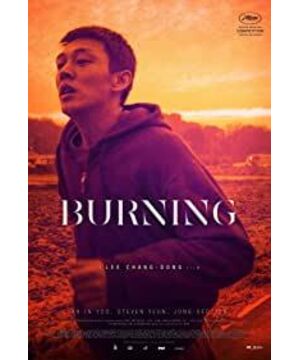1.
Is Haruki Murakami a first-rate writer? Everyone has been arguing about this for a long time. But what is certain is that in the imitation of South American magical realism, he found the secret of how to maintain the mystery of his short stories: leaving only the process and results of the event without asking for the cause and answer. Let the characters break through the framework of their daily social identity, and make behaviors that are incomprehensible but full of expressive personality. The dreamy atmosphere of his works and the weird perversions permeated in the daily narratives are precisely due to the behavioral motivations of the characters that cannot be covered by such normal thinking and logic.
As the blueprint for Li Cangdong’s film "Burning", Murakami’s short work "Burn the Warehouse" is about one of the hero’s motives for "burning the warehouse," the reason for the heroine’s inexplicable disappearance, and the possible connections between the two. They are all unclear. He just portrayed the slight confusion they brought to the "I" as the observer in an understatement, and then let them drift away like wind-blown dust and no longer exist.
Summarizing its aesthetic characteristics with Eastern style aesthetics, we can call it "leave blank"; Western style literary theory conjectures its meaning, and it has a touch of "existentialism": events are observed in their occurrence, development, and development. It ends and exists, and the observer's understanding of its internal reason and logic cannot shake its value.
This is the core writing methodology of Haruki Murakami's short stories.
2.
The best way to destroy the "mystery" of a work is to put a fixed logical thinking framework on it, so as to limit the meaning of the characters' behavior and language, and make an explanation with clear meaning.
From this perspective, although most of the storyline of "Burning Chamber" is borrowed from the story, Li Cangdong's "Burning" is at the core of "Burning Chamber" in an all-round way: it is not satisfied with the "existence" of characters and events. Rather, within the social ideological framework defined by the director, he attempts to give "mystery" an explanation with the creator's vivid and concrete concept.
Li Cangdong is an author-type director with a strong ideological concept. Whether it's the reference to the "Gwangju Incident" in "Mint", or the concern for socially disadvantaged groups in "Oasis", or the questioning of religious ideology in "Miyang", or the sense of moral guilt in "The Poetry" His torment has shown his customary thinking that he must locate his own expression space in specific social and political events and moral and ethical issues.
When he set the original motivation for "Burning" to express the "anger" of young Koreans, he actually pointed to the hatred and resentment caused by the huge gap between the rich and the poor and the unequal opportunities in Korean society: in addition to poverty, society Injustice and unkindness for wealth, what else can ignite the continuous directed eruption of young people's anger on a large scale?
Therefore, the three-person relationship that cannot be clearly defined in "Burn the Warehouse" evolved into a confrontation of different class identities in Li Cangdong's adaptation: the children of the working people who struggled with unemployment, poverty, legal proceedings, and love illusions but could not find a way out. Young Li Zongxiu, against the rich, chic, who treats work as play and thinks that being rich and powerful can determine the destiny of things outside the body (people), and wants to get rid of poverty and destiny and is deeply tempted by the dazzling external world. Shen Haimei of the trap.
The "burning warehouse" has been "destroyed" from Murakami Haruki's expressionist ethics, and turned into a metaphorical symbol of the rich and powerful in Li Cangdong's works that demonstrates his power to determine the world.
After experiencing a series of desperate dilemmas determined by the identity of the bottom society, the character Li Zongxiu in the film finally exploded with raging anger because his beloved Shen Haimei "disappeared" like a burnt plastic greenhouse, and he was unable to pass. The upper class (represented by Ben) challenged by normal channels attacked in anger.
3.
In different interviews, Li Cangdong emphasized the need to give "Burning" a certain mystery. It is also true that there are some details that have no clear answers in the film, such as whether cats and wells really exist? Who is making mysterious calls to Li Zongxiu's home again and again? What does the burnt plastic greenhouse described in this article represent? What is the actual whereabouts of Shen Haimei? And did the final murder actually happen or did Li Zongxiu fabricate it in his own novel?
However, the uncertainty of the small details of these branches does not detract from the conclusiveness of the overall framework of "Burning". The main storyline structured along the most traditional and simple cognition of "class contradiction" will inevitably lead Li Zongxiu into the opposition to the original. This leaves the "I" as an observer in "Burning a Warehouse" with a curious and mysterious atmosphere of perplexity and color.
These unexplainable questions bring not so much mystery, but rather a slight "obscure method" of "smearing" the core of ideological expression, so as to distinguish the film from other commercial genres.
Or it can be understood like this: It is precisely because of the inability to grasp the details of these question marks that Li Zongxiu has fallen into the passive madness of losing control of the life around him. This finally made him surely head towards the path of releasing the flames of fury by destroying the children of the rich, whether this was a real event or a conjecture in his mind.
In particular, Li Cangdong couldn’t help revealing some information about the answers to these puzzles in the film: for example, the cat found in Ben’s home, the rumors about Shen Haimei’s “running the train with his mouth full,” and the female red found in Ben’s drawer. The watch and the picture of Li Zongxiu who is sitting in Shen Haimei’s home quickly tapping on the computer keyboard. These hints have definitely inspired the fire of revenge in Li Zongxiu's mind.
For "Burning", a film with such clear and unmistakable social ideological concepts, any preconceived mystery will be guided and dispelled by its fixed thinking framework, and will eventually flow into irrelevant mysteries.
What is the answer to those detailed questions is not important, what is important is that they lead the protagonist to a definite thinking and behavior ending, which is the functional intention of setting them. The three characters in the film have unchangeable facial fate due to the solidification of the setting. The moments that attempt to show their human charm and flesh and blood life (such as the sunset dance that is repeatedly praised) are all because of Reluctantly left behind from the main plot and reduced to an event landscape postcard picture.
The raging fire that burned down the Porsche 911 at the end of the film did not spread chaotically, but only burned Ben's body in a targeted manner. The fire illuminates the motif of "Burning" releasing new forms of class hatred in contemporary society. Contrary to Haruki Murakami's original work "Burning Warehouse", which has vague meaning and directionality, this adaptation film with a seemingly clear plot and thin information like air is actually a video carrier with clear core ideas.
4.
When the concept, form and expression of the film have all slid in the same fixed direction, and there is only the external "decorative suspense" of "flower fist embroidered legs", both the creator and the viewer are faced with an ultimate problem. : Did you discuss a question that conforms to the values of a certain part of the masses in terms of moral judgment and socio-political tendencies? This film undoubtedly accomplished its task brilliantly?
In the history of Chinese film, there was once an authoritative guiding ideology that "As long as the literary and artistic works centered on the working class are excellent works", most films of that era were buried under the political "commander" as a single ideological judgment. Make a conclusive explanation. To this day, at internationally authoritative film festivals like Cannes, films with provocative socio-political issues will still conditioned reflexively stimulate the secretion of adrenal hormones in many Western film critics.
But on the other hand, some filmmakers who have been labeled with clear political labels, such as Nagisa Oshima, Shohei Imamura, and Yasuzou Masamura, who were classified as New Waves in Japan, are trying to make their films full of ambiguities. Emotional eruption. Although the above-mentioned authors and directors appeared with a clear left-wing banner, when we went deep into the films "Red Murder", "The Cemetery of the Sun", and "The Wife of the Qing Dynasty", we can find that under the subversive expression of rebellion, What they bloom is the release of sensibility and rational emotions that cannot be clearly defined as good and evil, beauty and ugliness, full of instantaneous changes. To a certain extent, they use the background platform of ideological expression to outline and highlight those unpredictable and likely human changes at any time.
Contrary to the above works, "Burning" binds all these elements with the potential for derailment changes to the main axis of deep ideological expression. Those "phenomenological" detailed storylines that have no answer have lost the charm of derivative changes because of the super stable core "keel" of the film. And most importantly, because the three characters are firmly embedded in this ideological "keel", they only have a symbolic ideographic value and a socialized status symbol. All their words, actions and expressions strictly serve the expression of core ideological concepts. But this kind of conceptual expression does not allow the character to have that flesh and blood, emotional change, and unpredictable self.
In the final analysis, the emptiness of "Burning" comes from its dependence on ideological expression. The point of creation that inspired Li Cangdong's excitement actually focused on the judgment of moral value, but he tried hard to graft such judgments with personal irrational emotions, and he lacked sufficient understanding of the internal conflicts between these two forces. The clues suggesting that at the end of the film can't hold back the appearance anyway, are actually out of Li Cangdong's unrepressive need for expression of value, and it is precisely because of this that the potential of the film is almost completely suppressed. Such "rigidity" in the expression of the deep conception makes all the emotional atmosphere, mysterious questions, confusion and even anger that the film intends to create in the superficial details have lost the room for reverberation, and eventually tends to be a rationally determined and emotionally pale. The useless work.
View more about Burning reviews











